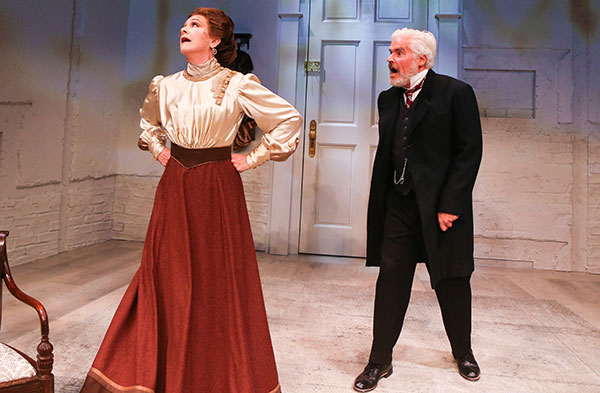The institution of marriage has changed drastically over the last century. Flash back to the late 1800s, and this male-favored power structure would be unrecognizable to (most) modern married couples.
At the time playwright Henrik Ibsen penned his seminal problem play A Doll’s House in 1879, he was remarking on the traditional roles men and women played within the construct of marriage. In this work, the wife, Nora, leaves the husband, Torvald, for no other reason than she is unhappy in the relationship. Victorian-era audiences viewed this act of female defiance—one punctuated with Nora’s slamming of the door to the family home upon her departure—as utterly scandalous.
Fast-forward to the twenty-first century, and Nora’s leaving is not so shocking anymore. It is within this modern milieu that playwright Lucas Hnath picks up where Ibsen left off. In A Doll’s House, Part II, Hnath explores what happens when, 15 years after her famous door slam, Nora returns to confront Torvald.
Time has treated Nora well; she’s a successful writer who tackles the topic of marriage while working under a pseudonym. But when a local judge gets annoyed that her writing influenced his wife to leave him, he sets out to ruin Nora’s life by exposing the fact that she is still married to Torvald despite her advocations for the dissolution of the institution.
A Doll’s House, Part II premiered on Broadway in 2017 and went on to earn eight Tony Award nominations. Now, the Maltz Jupiter Theatre is staging its regional premiere with a production that is both thoroughly modern and amusingly antiquated. You can catch it onstage through March 10.

Director J. Barry Lewis embraces the play’s push-and-pull between contemporary thinking and archaic behavior, sprinkling in a handful of au courant songs and sound cues, and also empowering his cast to explore how the audience might relate to their characters. It turns out, for all the ways marriage has changed, relationships—and their inherent issues—transcend societal progression.
This idea is at its most palpable during Nora and Torvald’s fights. While Nora might be dressed in Victorian garb, her accusation of Torvald being condescending during their relationship is all too relatable. And where Torvald might carry a pocket watch, his qualms with Nora’s flirting and eye rolling are timeless.
As Nora, Carol Halstead presents an antihero that is equal parts likeable and confounding. Halstead portrays Nora’s confidence in her decision to leave, but also conveys the character’s deep sorrow about abandoning her children. Mothers, in particular, might find it difficult to empathize with Nora, but Halstead imbues her with a certain intellectualism that is hard to argue with.
Torvald, on the other hand, is a ball of emotions. Paul Carlin adds an unexpected physicality to the character, blowing raspberries when he finally realizes who Nora is and taking tight little hops during moments of heightened anger. His energy is matched only by the family’s nanny, Anne Marie, played with amazing comedic timing by Mary Stout. Walking about with a slight limp and humorous wobble, Stout brings down the house with choice expletives and frank declarations of “I’m pissed!”.

The audience sees a different side of Halstead’s Nora when she spars with her daughter, Emmy. Mikayla Bartholomew is a strong counterpoint to Halstead; she at once highlights their characters’ similarities and accentuates their differences. By leaning into Emmy’s frank approach to delivering the facts of life (she describes the time she went searching for Nora’s death certificate with an almost disturbing lack of emotion), Bartholomew successfully illustrates how Emmy sought to compartmentalize her mother’s absence. Not only that, but instead of yearning for her mother, Emmy turned that desire for a reliable parental unit into the practical search for a traditional romantic partner of her own.
A Doll’s House, Part II is a meaty piece of modern dramatic literature. Its chock-full of layers of meaning and dramaturgical nuance—and the Maltz Jupiter Theatre cast and crew clearly has a lot of fun exploring it all. For those who might be intimidated by their lack of knowledge about the source material, fret not! The theater is hosting brief presentations on A Doll’s House 45 minutes prior to each performance. It’s the CliffsNotes you’ll need to fully appreciate this stellar production.








Facebook Comments